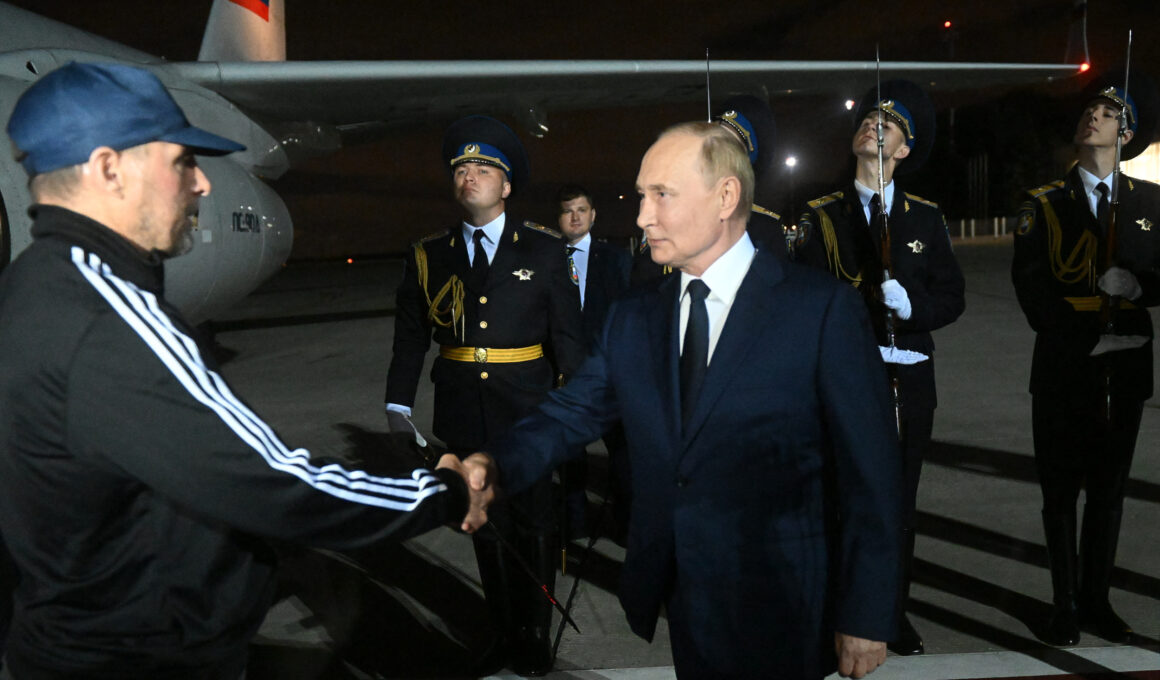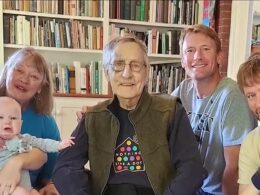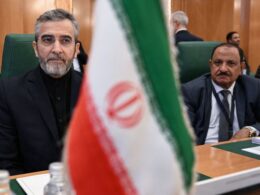Vadim Krasikov, a political assassin freed as part of a sweeping prisoner exchange between Russia and the West on Thursday, may have been involved in the death of Vladimir Putin‘s political mentor Anatoly Sobchak more than two decades ago, a German newspaper has alleged.
Russian political assassin and former intelligence officer Krasikov was handed a life sentence in Germany in 2021 over the killing of Zelimkhan Khangoshvili, a former Chechen separatist fighter in Berlin in 2019.
Krasikov, 58, was released as part of the largest prisoner exchange between Russia and the West since the end of the Cold War. President Putin, who has described Krasikov as a “patriot” who “liquidated a bandit” in “one of the European capitals,” was filmed meeting him on the tarmac after he landed in Moscow, holding the hitman in an embrace.
In return, Putin freed 16 prisoners, including The Wall Street Journal reporter Evan Gershkovich, a 32-year-old American citizen who was detained in Russia in March 2023, and U.S. citizen Paul Whelan, a former Marine and computer security official who has been in jail in Russia since 2018.
German tabloid newspaper BILD reported late Thursday that Krasikov could have been behind the death of Putin’s former mentor Sobchak, thus fomenting the Russian leader’s rise to power. Newsweek couldn’t verify the allegation and has contacted Russia’s Foreign Ministry for comment by email.
Vladimir Putin personally greets and embraces Vadim Krasikov on the red carpet in Moscow. Krasikov, an FSB officer, was serving life in Germany for assassinating a former Chechen commander in Berlin’s Tiergarten park pic.twitter.com/RL6ljXvUz4
— Mediazona English (@mediazona_en) August 1, 2024
Sobchak, who was mayor of St. Petersburg from 1991 to 1996, died 24 years ago aged 62 while visiting Russia’s Kaliningrad province, an exclave between Poland and Lithuania. He was at one point seen as a potential candidate for Russian president. His cause of death was listed as a heart attack.
He was in Kaliningrad at Putin’s request for campaign purposes. At the time, Putin, who was acting Russian president, had launched an election campaign. He appointed Sobchak as his “empowered representative” to campaign for him across the country, and asked the former mayor to travel urgently to the exclave on February 17, 2000, on short notice. He died days later.
Suspicions were raised after two separate autopsies were carried out in Kaliningrad and in St. Petersburg, prompting the exclave’s prosecutor’s office to launch a criminal investigation that Sobchak’s death was a “premeditated murder with aggravating circumstances.” The case was closed three months later, however, despite being unsolved.
BILD said it learned that Western intelligence agencies believe Putin and Krasikov were previously closely linked, and that Putin pushed for his release because he feared the hitman would reveal damaging information to German authorities as part of a potential deal.
“Is Krasikov connected to the alleged murder of Putin’s political mentor? And does the trail lead to Putin himself? Western intelligence suspects exactly that and suggests that this is why Putin fought so hard for Krasikov’s release,” the newspaper said.
“If the intelligence services’ suspicions about his involvement in Sobchak’s murder are true, it will call into question Putin’s favorite character trait – loyalty, which he supposedly values so highly,” the tabloid added on its Telegram channel.
Krasikov’s return to Russia was personally demanded by Putin.
Russian and Ukrainian lawyer Ilya Novikov told independent news outlet Meduza in an interview published late Wednesday that after the release of Russian arms dealer Viktor Bout in December 2022, Krasikov became “the number one person Putin wants to bring back.”
“I don’t think Putin particularly likes Krasikov, but this dramatically increases the number of volunteers ready to become his killers,” Novikov said. “Potential killers will understand that even if you kill, get caught and get a life sentence, after a while your homeland will still get you, so there are no risks, everything is great.”
Vlad Mykhnenko, an expert in the post-communist transformation of Eastern Europe and the former Soviet Union at the University of Oxford in the United Kingdom, told Newsweek that Thursday’s prisoner swap “sends all the wrong signals not only to Moscow but also to anti-Western forces all over the world.”
Moscow is “running an effective racket operation against the West by kidnapping innocent and naive Westerners, who happened to enter Russia on personal business, whilst getting its own spies, murderers, cyber-criminals, and thugs of all sorts released back to Russia scot-free.”
“Now every Russian spy, operative, agent abroad is rest assured that however horrific the crime he or she is going to commit abroad, Moscow will always get them back home,” Mykhnenko added.
Do you have a tip on a world news story that Newsweek should be covering? Do you have a question about the Russia-Ukraine war? Let us know via worldnews@newsweek.com.








